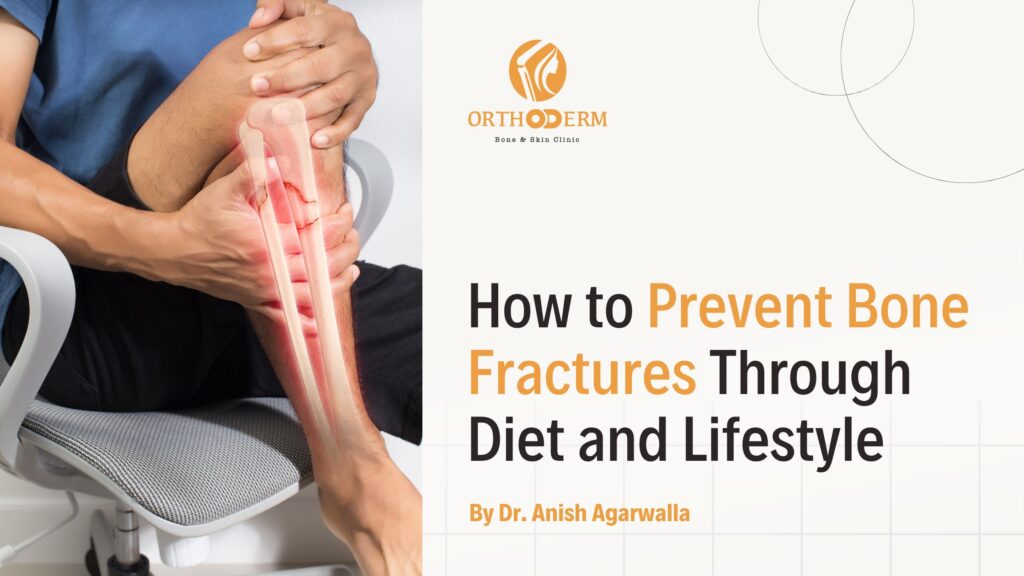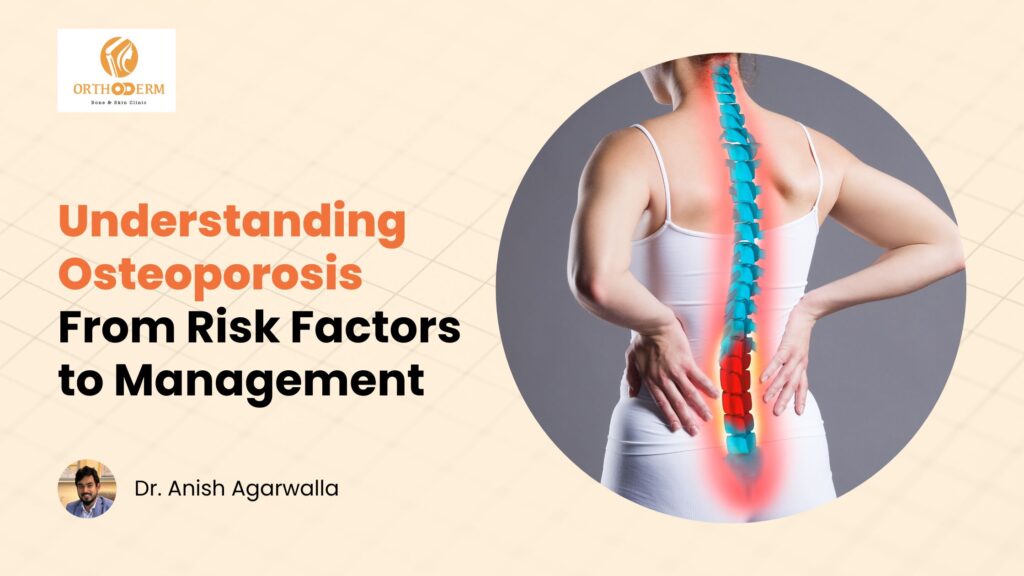Have you ever experienced a sudden, sharp pain in your hip or wrist that left you feeling helpless? These unexpected fractures can significantly impact our quality of life. In India, where bone health is a growing concern, understanding the factors that contribute to fractures and taking proactive steps to prevent them is crucial.
In this blog post, I’ll delve into the importance of bone health and explore how diet and lifestyle choices can play a pivotal role in reducing the risk of fractures. By understanding the underlying causes and implementing practical strategies, we can empower ourselves to strengthen our bones and enjoy a healthier, more active life.
Understanding Bone Health
Bones, often seen as mere structural supports, are dynamic tissues that undergo constant renewal. Unfortunately, many of us neglect the importance of maintaining bone health until it’s too late.
One common bone health condition is osteoporosis, a disease characterized by weakened bones that are more susceptible to fractures. In India, osteoporosis is a significant public health concern, especially among women and the elderly.
Recognizing the early signs of osteoporosis is crucial for timely intervention. Symptoms may include back pain, unexplained fractures, loss of height, and stooped posture. If you notice any of these symptoms, it’s essential to consult a healthcare professional for evaluation.
The Role of Diet
A balanced diet is a cornerstone of strong bones. Certain nutrients are essential for bone health, including calcium, vitamin D, protein, magnesium, and potassium. These nutrients work together to build and maintain bone tissue.
- Calcium is a well-known mineral crucial for bone health. It’s found in dairy products like milk, yogurt, and cheese. However, for those who are lactose intolerant or vegan, there are alternative sources like fortified plant-based milk, tofu, and leafy greens.
- Vitamin D plays a vital role in calcium absorption. Sunlight exposure is the primary source of vitamin D. However, in India, where sunlight exposure can be limited due to cultural practices or seasonal factors, it’s important to consider dietary sources like fatty fish, egg yolks, and fortified foods.
- Protein is essential for bone formation and repair. It can be found in various sources, including meat, poultry, fish, eggs, legumes, and dairy products.
- Magnesium and potassium are also essential for bone health. They help regulate calcium balance in the body. Good sources of magnesium include whole grains, nuts, seeds, and leafy greens. Potassium-rich foods include bananas, avocados, and spinach.
By incorporating these nutrient-rich foods into your diet, you can provide your bones with the necessary building blocks for optimal health.
The Importance of Lifestyle
While diet plays a crucial role in bone health, lifestyle factors also significantly impact bone strength. Regular exercise, adequate sun exposure, avoiding harmful habits like smoking and excessive alcohol consumption, and maintaining a healthy weight are essential for preventing fractures.
- Regular exercise is a powerful tool for strengthening bones. Weight-bearing exercises, such as walking, jogging, dancing, and strength training, help stimulate bone growth and density. Incorporating these activities into your routine can significantly reduce the risk of fractures.
- Sun exposure is essential for vitamin D production, which is vital for calcium absorption. However, excessive sun exposure can increase the risk of skin damage. Aim for moderate sun exposure, especially during the morning or late afternoon hours, while protecting your skin from harmful UV rays.
- Smoking and excessive alcohol consumption can have detrimental effects on bone health. Smoking accelerates bone loss, while excessive alcohol intake can interfere with calcium absorption and increase the risk of falls. If you smoke or drink excessively, it’s important to quit or reduce your consumption.
- Maintaining a healthy weight is crucial for bone health. Excess weight can put additional stress on your bones, increasing the risk of fractures. A balanced diet and regular exercise can help you achieve and maintain a healthy weight.
By adopting a healthy lifestyle, you can significantly improve your bone health and reduce the risk of fractures.
Bone Health Tips for Indians
India has a rich cultural heritage that influences dietary habits and lifestyle practices. While many traditional Indian foods are nutritious, it’s important to be mindful of certain cultural factors that may impact bone health.
Dietary considerations:
- Vegetarianism: Many Indians follow vegetarian or vegan diets. Ensure you’re consuming enough calcium-rich plant-based foods like tofu, fortified plant-based milk, and leafy greens.
- Spices: While Indian spices are generally beneficial for overall health, some may interfere with nutrient absorption. Consult a healthcare professional if you have concerns about the impact of spices on your bone health.
Lifestyle practices:
- Sun exposure: Due to cultural norms and limited sunlight exposure, many Indians may be deficient in vitamin D. Consider incorporating vitamin D supplements into your diet, especially during winter months.
- Traditional remedies: While some traditional remedies may have potential benefits for bone health, it’s important to consult a healthcare professional before using them. Avoid self-medication and always prioritize evidence-based approaches.
Consulting a healthcare professional:
It’s essential to consult a healthcare professional for regular check-ups and to address any bone health concerns. They can assess your risk factors, recommend appropriate tests, and provide personalized advice.
By incorporating these tips into your daily routine, you can take proactive steps to protect your bone health and reduce the risk of fractures.
Conclusion
Strong bones are essential for a healthy and active life. By understanding the factors that contribute to bone health and taking proactive steps to prevent fractures, we can significantly improve our quality of life.
Remember, a balanced diet rich in calcium, vitamin D, protein, magnesium, and potassium is crucial for bone health. Incorporating regular exercise, adequate sun exposure, and avoiding harmful habits like smoking and excessive alcohol consumption can further enhance bone strength.
Don’t wait until it’s too late. Take control of your bone health today! Incorporate these dietary and lifestyle tips into your daily routine to reduce your risk of fractures and enjoy a more active, pain-free life.
If you have concerns about your bone health, I encourage you to call us at +91 70020 33804 or click here to schedule a consultation for personalized advice.
Frequently Asked Questions About Bone Health and Fracture Prevention
Q: What is osteoporosis, and why is it a concern in India?
A: Osteoporosis is a disease characterized by weak, brittle bones that are more susceptible to fractures. It is a growing concern in India due to various factors, including increased life expectancy and changing lifestyles.
Q: Are there any specific risk factors for osteoporosis in Indians?
A: While osteoporosis can affect anyone, certain factors may increase your risk in India. These include age, gender, family history, dietary habits, and lifestyle choices.
Q: What are the essential nutrients for strong bones?
A: Essential nutrients for bone health include calcium, vitamin D, protein, magnesium, and potassium.
Q: Are there any specific Indian foods that can help strengthen bones?
A: Yes, many Indian foods are rich in bone-healthy nutrients. These include milk, yogurt, cheese, lentils, spinach, almonds, and fortified foods.
Q: How can I ensure I’m getting enough calcium in my diet if I’m lactose intolerant?
A: If you’re lactose intolerant, you can still get enough calcium from fortified plant-based milk, tofu, and leafy greens.
Q: What type of exercises are best for bone health?
A: Weight-bearing exercises, such as walking, jogging, dancing, and strength training, are beneficial for strengthening bones.
Q: How much sun exposure is necessary for bone health?
A: Aim for moderate sun exposure, especially during the morning or late afternoon hours, while protecting your skin from harmful UV rays.
Q: Does smoking affect bone health?
A: Yes, smoking can accelerate bone loss and increase the risk of fractures.
Q: Are there any traditional Indian practices that can benefit bone health?
A: While some traditional remedies may have potential benefits, it’s important to consult a healthcare professional before trying them. Avoid self-medication and always prioritize evidence-based approaches.
Q: When should I see a doctor for bone health concerns?
A: If you experience any symptoms of osteoporosis, such as unexplained fractures, back pain, or loss of height, it’s important to consult a healthcare professional for evaluation.



